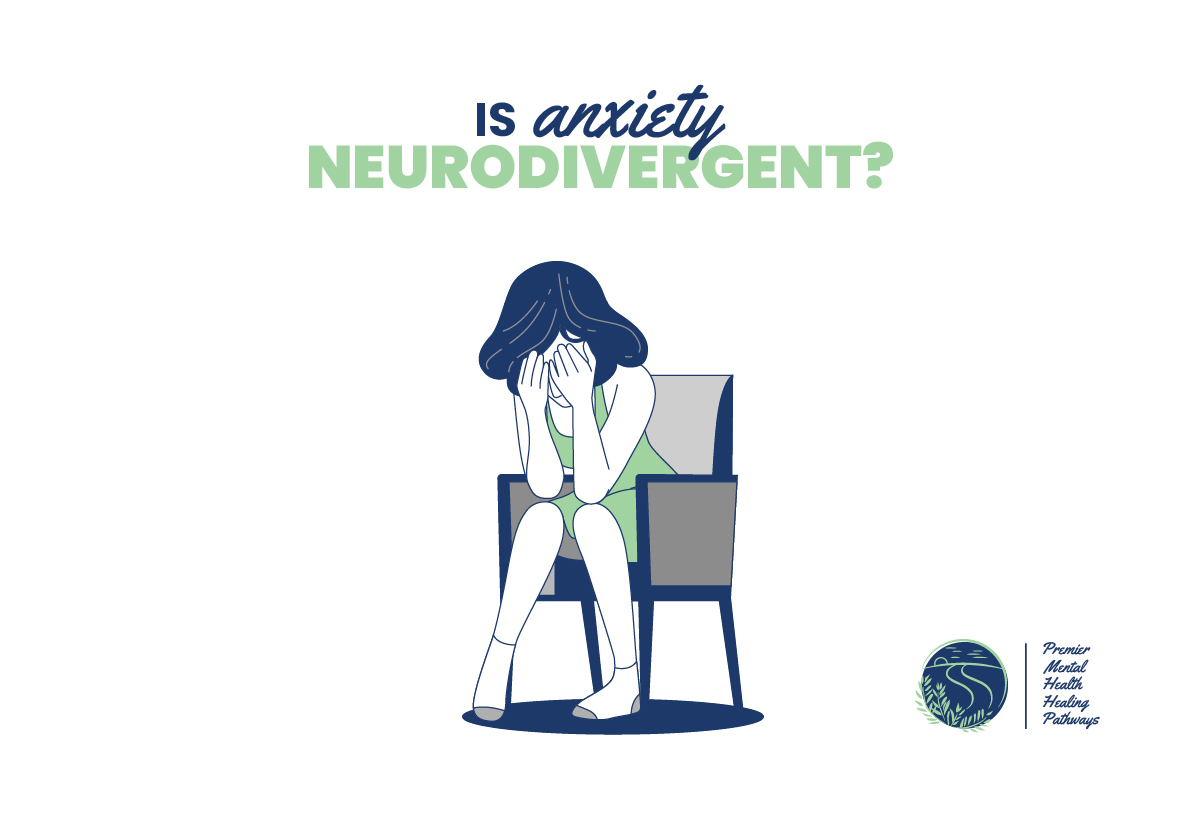If you have anxiety, you might feel like the world was not made for you.
How you understand things or talk to others differs from how your friends do it.
Connect with people who have neurodiversity. Finding out what this word means can be helpful.
At Premier Mental Health Healing Pathways, our professional, Beverly Ann White, deals with all types of mental health, like depression and anxiety.
Let’s look into this detail: Is anxiety neurodivergent?
What is Neurodivergent?
Neurodivergent is a word used to describe people whose brains work differently. It can mean they have different strengths and challenges compared to others.
While some may have medical conditions, others might not have a diagnosis but still experience differences in brain function.
There are different kinds of neurodiversity, such as autism, ADHD, dyslexia, dyspraxia, Tourette syndrome, trouble with math, trouble with writing, and trouble with math. Scientists used to think of it as a problem, but now they see its benefits:
- Finding out what makes each person shine
- Effectively taking in information
- promoting new ideas
- Fighting for fairness in society
- Meaningful value addition
- Growing a vivid imagination
- Creating meaningful connections
Neurodiversity can make it hard to do things, like manage your time (if you have ADHD), but it can also make you passionate and creative. Even though neurodiversity is not a physical disability, it could be seen as a learning difference or a hidden disability.
Are you neurodivergent?
Common signs of neurodiversity include:
- Social communication problems
- Problems with speech and language
- Focusing, reading, math, understanding spoken language, and staying organized are all things that can make learning hard.
- Strange responses to things like noise, light, temperature, pressure, and crowds
- They want to keep their interests the same based on age and the situation.
- Behavioural changes that are not normal, like rocking, tics, and outbursts
People who think they might have neurodivergence should see a doctor to get checked out.
It can result in a specialist referral for an official diagnosis and tailored support and services.
A diagnosis can help family members understand and support you, and workplace accommodations or support groups may be needed.
People can feel anxious before tests, job interviews, or medical appointments. You might feel uneasy, worried, or scared if you feel anxious. Anxiety can keep people awake and motivated, but it becomes a problem when it gets in the way of daily life.
Being afraid, tense, having trouble focusing, being irritable, and feeling disconnected from oneself or one’s surroundings are all psychological signs of anxiety. Some physical signs may include:
- Restlessness
- Dizziness
- shaky legs
- Nerves and stress
- Feeling short of breath
- Heart palpitations
- Nausea
- Sweating
- Sleep disturbances
They might be making panic attacks worse.
Anxiety can also change how people act, making them do things like cut ties with friends and family, have trouble going to work, and avoid certain places.
Is Anxiety Neurodivergent?
Anxiety is not usually thought of as neurodiverse. Anxiety disorders are not the same as neurodivergence, even though people with neurodivergent conditions like autism or ADHD may also have anxiety as a symptom.
Anxiety disorders are mental illnesses that cause people to worry, fear, or be nervous all the time. They can happen to people with or without neurodivergent traits.
Let’s sum up Is anxiety neurodivergent?
Even though anxiety is not usually thought of as neurodivergent, people who have it may feel like the world is not working for them. Neurodiversity includes the different ways that people’s brains work.
Understanding this is very important. For people with anxiety or neurodivergent conditions, asking for help can lead to more personalized assistance and a better understanding from family, friends, and society as a whole.
FAQs
How can I self-help with neurodivergence?
A: Neurodiverse people can help themselves by making routines, going to therapy, practising mindfulness, joining supportive communities, and using tools to help them.
Is Obsessive-Compulsive Disorder (OCD) considered neurodivergent?
A: OCD is usually thought of as a neurodevelopmental disorder instead of a strict neurodivergent disorder because the person has the same thoughts and actions over and over again.
Why is neurodiversity important?
A: Neurodiversity is essential because it recognizes that people have different cognitive abilities. It encourages acceptance, understanding, and flexibility for different ways of thinking and functioning.
What causes neurodivergence?
A: Neurodiversity has many causes, such as genetics, brain structure and function, influences during pregnancy, the environment, and experiences in early childhood.






No comment